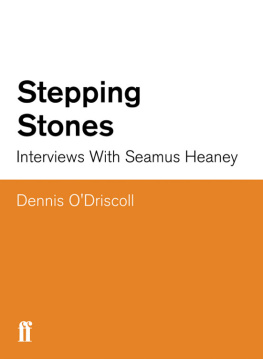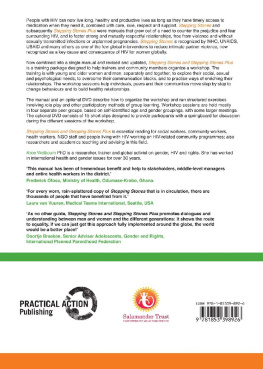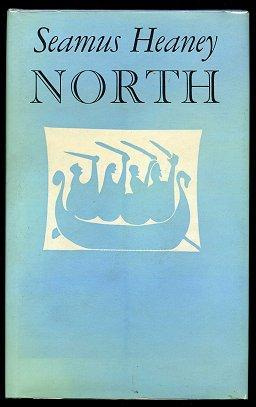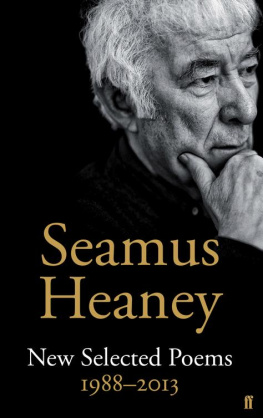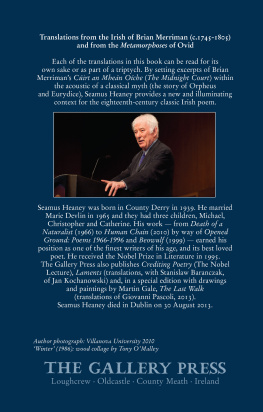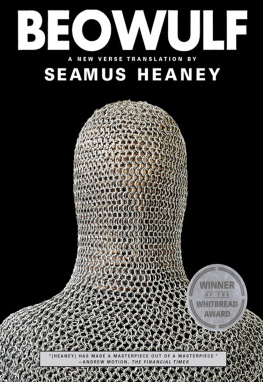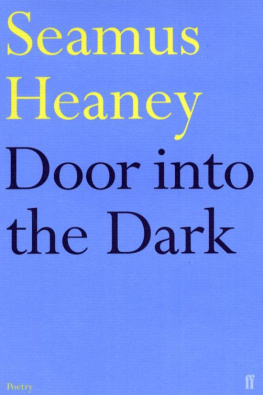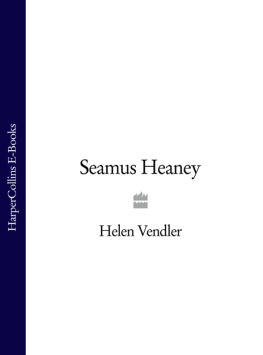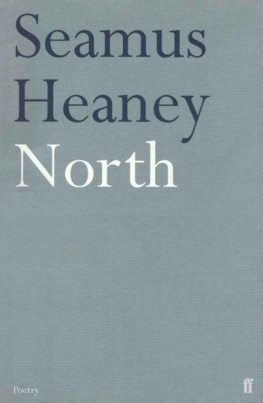Dennis O’Driscoll - Stepping Stones: Interviews with Seamus Heaney
Here you can read online Dennis O’Driscoll - Stepping Stones: Interviews with Seamus Heaney full text of the book (entire story) in english for free. Download pdf and epub, get meaning, cover and reviews about this ebook. year: 2009, publisher: Faber & Faber, genre: Art. Description of the work, (preface) as well as reviews are available. Best literature library LitArk.com created for fans of good reading and offers a wide selection of genres:
Romance novel
Science fiction
Adventure
Detective
Science
History
Home and family
Prose
Art
Politics
Computer
Non-fiction
Religion
Business
Children
Humor
Choose a favorite category and find really read worthwhile books. Enjoy immersion in the world of imagination, feel the emotions of the characters or learn something new for yourself, make an fascinating discovery.
- Book:Stepping Stones: Interviews with Seamus Heaney
- Author:
- Publisher:Faber & Faber
- Genre:
- Year:2009
- Rating:5 / 5
- Favourites:Add to favourites
- Your mark:
- 100
- 1
- 2
- 3
- 4
- 5
Stepping Stones: Interviews with Seamus Heaney: summary, description and annotation
We offer to read an annotation, description, summary or preface (depends on what the author of the book "Stepping Stones: Interviews with Seamus Heaney" wrote himself). If you haven't found the necessary information about the book — write in the comments, we will try to find it.
Stepping Stones: Interviews with Seamus Heaney — read online for free the complete book (whole text) full work
Below is the text of the book, divided by pages. System saving the place of the last page read, allows you to conveniently read the book "Stepping Stones: Interviews with Seamus Heaney" online for free, without having to search again every time where you left off. Put a bookmark, and you can go to the page where you finished reading at any time.
Font size:
Interval:
Bookmark:
A wise mans wisdom needs to be extracted, Bertolt Brecht remarks in his poem about the cross-examining Customs man who seizes on the knowledge which the sage Lao Tsu is smuggling into exile. On 9 September 2001, Seamus Heaney called to my office in the International Branch of Irish Customs, around the corner from Dublin Castle, once the centre of English power in Ireland and now the powerhouse of Irelands Revenue and Customs service. In my cramped room, at the end of the long, low, crepuscular corridor resembling a smugglers tunnel more than the fifth-floor passageway of a modern office block Heaney, having already agreed in principle to an interview book I had proposed by letter (citing auspicious precedents: Conversations with Czesaw Miosz, Vaclav Havels Disturbing the Peace, Eugne Guillevics Living in Poetry), elaborated on his ideas for the project. It cannot have been easy for him to face an extensive series of interviews, knowing that this would add further pressures to a life in which literary acclaim has been accompanied by massive claims on his time.
Had he inclined towards refusal, I would not have pursued the matter. Having witnessed for myself the daily arrival by green An Post van of a sackful of requests, invitations, proofs, academic enquiries, personal letters, manuscripts-in-progress and glossy new books, to a house where neither phone nor fax enjoys a moments respite, I knew he had strong grounds for hesitation. His presence at a book launch, his speech at an art-gallery opening, his place at a Friday-night dinner table; his reading, his lecture, his review, his blurb, his oration, his nomination, his reaction to some public event everyone has plans that involve snatching him away from his poems.
Now here I was, embarking on a project which would encroach on his dream time even further. What I told myself in mitigation, and what I hope this book bears out, is that a volume of linked interviews with Seamus Heaney would be a substantial addition to his oeuvre rather than merely a subtraction and distraction. Moreover, I decided from the start not to propose, let alone impose, any deadline for completion of the book. The priority for the poet must be his poetry; and the poetry must determine the agenda and dictate the deadline. Happily, it was during the years in which this book was under way that Heaney wrote virtually all of the poems in District and Circle (2006). Some poems (Anahorish 1944, Tates Avenue and Home Help, for instance) drew their initial inspiration from the ongoing interviews; others were excerpted directly from Chapter 8 as the opening sections of Found Prose and Out of This World. As more recent poems also began to emanate from these interviews, Heaney referred to the book as a potent stirrer-up of memories. Poems apart, The Burial at Thebes, his version of Sophocles Antigone, opened in the Abbey Theatre, Dublin in 2004; Finders Keepers, a generous selection from his lifetimes output of autobiographical and critical prose, was published in 2002; and translations, essays and lectures continued to appear. Not surprisingly, there were lengthy periods when no progress with this book was feasible.
At Seamus Heaneys own request, the interviews were conducted principally in writing and by post. But at the risk of some small overlap with previous chapters (which are themselves not without unavoidable overlaps) Chapter 15 combines the transcripts of two interviews we recorded (one publicly, the other privately) in Santa Fe, under the auspices of the Lannan Foundation, in October 2003; and several of the remarks relating to District and Circle in Chapter 13 originated on the spacious stage of the Queen Elizabeth Hall, London, in April 2006, where I interviewed Heaney before an audience. My original plan had been to visit the poet on a specific day each week to record material which I would then transcribe. However, given the relentless demands he already faced and, until an illness in 2006, his frequent absences on foreign literary and academic travel this was not a practical proposition.
I therefore began to prepare the written questions and observations which form the basis of these interviews. The questions provided multiple choice options in that Heaney could decide which ones to answer and which to ignore, and could rearrange the order in which he responded to them. It would have been unrealistic to expect responses to all of these countless questions: my first set, confined to the themes of childhood and the early writing years, consisted of sixty-two packed pages; many hundreds of additional pages interlaced with question marks would eventually reach the poet who, for all his unfailing patience with this project, must sometimes have questioned his wisdom in laying himself open to such a grand inquisition.
In the process of working together towards a final text reviewing responses, filling gaps, remedying omissions, adding narrative links, augmenting connective tissue the conversational dimension of the material, though already evident (especially after the opening, orienting chapters), was further heightened. Each suite of questions was either bound by a thematic thread or more usually based around a specific collection of Heaney poems. I wanted to avoid a slavishly chronological approach; collection-centred questions fostered variety and flexibility, allowing for a blend of contemporaneous commentary and retrospective recollection. If this resulted in some anomalies for instance much of Heaneys reminiscence about his secondary schooling precedes the detailed focus on his primary schooling (for which the Station Island chapter presented an appropriate context) it seemed a quirky price worth paying, especially since the pay-off is more true to the manner in which normal conversation loops and meanders, advances and retreats, than any strictly chronological account could hope to be.
While this book does not therefore conform to biographical convention, the fact that Seamus Heaney has not been the subject of a biography was itself a stimulus to this work. But chronological biographies of famous writers almost inevitably become as predictable as the check-in routines at international airports once the authors gifts have been recognized and he or she is subsumed into the world of honours and awards and intercontinental literary travel. The adoption of a collection-based approach left me free at any stage to ask Heaney (whose books have all included eidetic evocations of childhood) about aspects of his growing up and his development as a writer. To avoid losing contact with the essential inner poet, especially when we touched on the periods in which the smiling public man began striding the literary world, was a constant objective. I tend to think of Seamus Heaney as a poet whose childhood notwithstanding its sorrowing aspects, discussed in this book had its Edenic dimensions: certainty and security, calendar customs and feast days, agrarian cycles and ecclesiastical rites. The wound of expulsion from that tried, tested and trusted world hurt him into a poetry of evocation, yearning and elegy.
Ian Hamilton, the English critic and poet, regarded Heaney as the most over-interviewed of living poets. Yet what initially prompted me to undertake this book was precisely the opposite view: a conviction that he was under-interviewed in more senses than one. It seemed to me that a major poet who has been a consistently engaging literary interviewee should be encouraged to expound his ideas and expand his recollections beyond the meagre word-counts of a newspaper or literary journal; also, that a broader range of themes should be explored than was usual in the past (when the contents of the latest Heaney publication, or the implications of the Ulster Troubles for his work, were the staple interrogative fare). Aside from a handful of exceptions including the interview by his friend Karl Miller (Between the Lines, 2000) and the
Font size:
Interval:
Bookmark:
Similar books «Stepping Stones: Interviews with Seamus Heaney»
Look at similar books to Stepping Stones: Interviews with Seamus Heaney. We have selected literature similar in name and meaning in the hope of providing readers with more options to find new, interesting, not yet read works.
Discussion, reviews of the book Stepping Stones: Interviews with Seamus Heaney and just readers' own opinions. Leave your comments, write what you think about the work, its meaning or the main characters. Specify what exactly you liked and what you didn't like, and why you think so.

